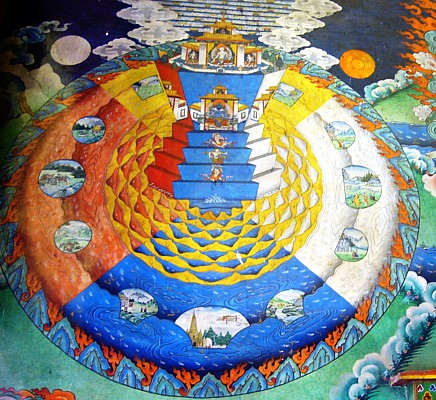Jambudvipa: Difference between revisions
No edit summary |
mNo edit summary |
||
| Line 4: | Line 4: | ||
“Since this continent is adorned by [a ''jambu''/Jambubriksha] tree, it is known as the 'Continent of Jambu', or Jambudvipa. The jambu tree is presumed by some to be the rose-apple tree (''Eugenia jambolana''). More recent scholarship suggests that it may be a variety of plum. However, legend says that only one jambu tree exists, which is not visible to ordinary persons but only to enlightened beings.”<ref>''Myriad Worlds'', footnote 16, page 266.</ref> | “Since this continent is adorned by [a ''jambu''/Jambubriksha] tree, it is known as the 'Continent of Jambu', or Jambudvipa. The jambu tree is presumed by some to be the rose-apple tree (''Eugenia jambolana''). More recent scholarship suggests that it may be a variety of plum. However, legend says that only one jambu tree exists, which is not visible to ordinary persons but only to enlightened beings.”<ref>''Myriad Worlds'', footnote 16, page 266.</ref> | ||
Another explanation among various explanations given for the continent being so named, one (in the [[Treasury of Abhidharma]]) is that a jambu tree grows in its northern mountains beside Lake Anavatapta, mythically considered the source of the four great rivers of India, and that the continent is therefore named from the tree or the fruit. | Another explanation among various explanations given for the continent being so named, one (in the ''[[Treasury of Abhidharma]]'') is that a jambu tree grows in its northern mountains beside Lake Anavatapta, mythically considered the source of the four great rivers of India, and that the continent is therefore named from the tree or the fruit. Jambudvipa has the [[Vajra Seat|Vajrasana]] at its centre and is the only continent upon which buddhas attain [[Enlightenment|awakening]].<ref>84000 Translating the Words of the Buddha.</ref> | ||
==Alternative Translations== | ==Alternative Translations== | ||
*the Rose-Apple Continent | *the Rose-Apple Continent | ||
*Continent/Island of Jambu | *Continent/Island of Jambu | ||
==References== | ==References== | ||
| Line 23: | Line 20: | ||
[[Category:Cosmology]] | [[Category:Cosmology]] | ||
[[Category:Abhidharma]] | [[Category:Abhidharma]] | ||
[[Category: Three Realms of Samsara]] | [[Category:Three Realms of Samsara]] | ||
Latest revision as of 07:44, 24 August 2024

Jambudvipa (Skt. Jambudvīpa; Tib. འཛམ་བུའི་གླིང་, Dzambuling, Wyl. ‘dzam bu gling, Eng. 'Rose-Apple Continent') — one of the four continents, which is situated to the south of Mount Meru. Its shape is trapezoidal or resembling the shape of an axe-head. It is the human world in which we live.
“Since this continent is adorned by [a jambu/Jambubriksha] tree, it is known as the 'Continent of Jambu', or Jambudvipa. The jambu tree is presumed by some to be the rose-apple tree (Eugenia jambolana). More recent scholarship suggests that it may be a variety of plum. However, legend says that only one jambu tree exists, which is not visible to ordinary persons but only to enlightened beings.”[1]
Another explanation among various explanations given for the continent being so named, one (in the Treasury of Abhidharma) is that a jambu tree grows in its northern mountains beside Lake Anavatapta, mythically considered the source of the four great rivers of India, and that the continent is therefore named from the tree or the fruit. Jambudvipa has the Vajrasana at its centre and is the only continent upon which buddhas attain awakening.[2]
Alternative Translations
- the Rose-Apple Continent
- Continent/Island of Jambu
References
Further Reading
- Jamgön Kongtrul, Myriad Worlds (Ithaca: Snow Lion, 1995), pages 112-113 & 131-134, ISBN 978-1559391887